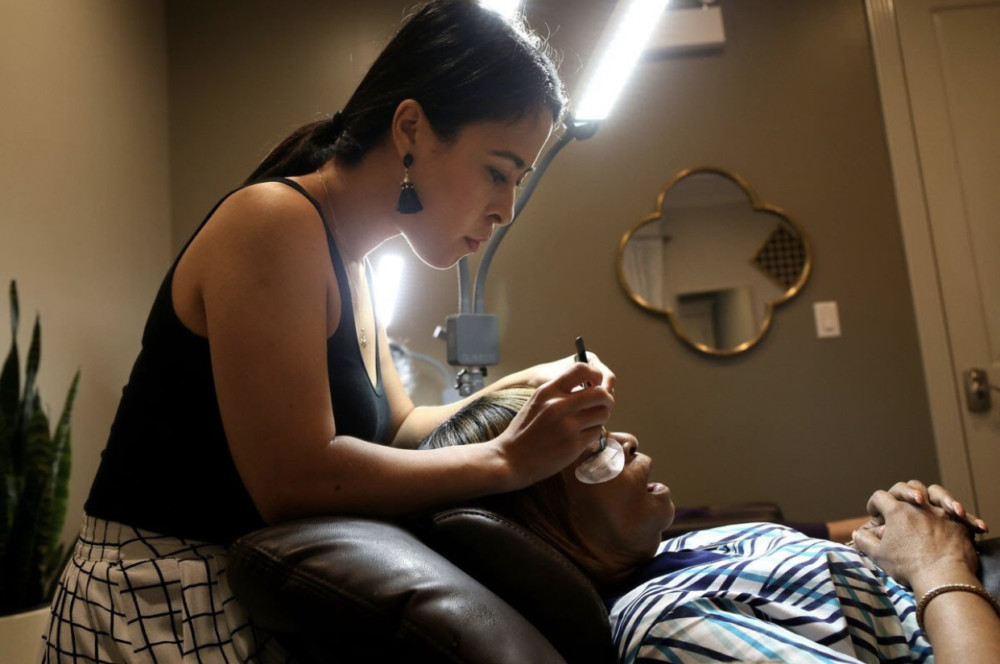By Abdel Jimenez
Chicago Tribune
WWR Article Summary (tl;dr) A Chicago area entrepreneurial training program, called “Grow” teaches budding business owners how to start and maintain their own businesses. It will now be offered in Spanish (in addition to English) in an effort to reach out to more Latino-owned businesses.
Chicago Tribune
When Maria Santacruz set out to open an eyelash extension parlor in 2016, she had very little in the way of business skills and almost no funding.
Nothing was going to stop her from achieving the American dream, so she used all of her savings to open Fabulash Beauty in the Lincoln Park area. But as an immigrant entrepreneur, she didn’t know what support was offered to guide her through the complexities of forming a business.
“I live in the South Side, and there are no resources for Latino-owned businesses,” Santacruz said. “I had to travel downtown to get to programs that would offer some help.”
Latino-owned businesses like Fabulash make up a small but growing force in the local economy. There were more than over 14,000 Latino-owned businesses in the Chicago area in 2016, according to the most recent census data.
However, Latinos face a wide range of challenges in trying to kick-start their businesses, from opening company bank accounts to finding funding.
And while business training programs like the one Santacruz sought help from are available to Latinos, the organizations that offer them don’t heavily market them, and some aren’t conducted in Spanish.
Organizations that offer resources to minority groups don’t always have the money to advertise training programs to members within the community, said Juan Mundel, a DePaul University assistant professor of public relations.
But at least two groups — Rogers Park Business Alliance and the Little Village Chamber of Commerce — are looking at ways to bring those resources to Chicago’s Latino community.
The business alliance, a nonprofit focused on economic development in the culturally diverse Far North Side community, is expanding its business training program to include a Spanish-speaking instructor and an office on Clark Street, close to the dozens of Latino-owned businesses along the corridor.
Executive Director Sandi Price said the group’s business training curriculum was so successful in English it decided to offer it in Spanish with the help of a $114,000 grant from the Coleman Foundation, a philanthropic group that supports a range of efforts including entrepreneurship education.
The alliance noticed a need for the program because Latino businesses in the neighborhood never consistently attended workshops being offered in English, Price added.
“We have a lot of Spanish-speaking businesses. A lot of them are small and independent and about 70 percent of them are on Clark Street,” Price said.
The alliance also hopes finding an office close to Latino businesses on Clark Street will help attract those owners to the training program. The Clark Street address will be separate from the alliance’s headquarters.
The alliance’s training program, called Grow, teaches entrepreneurs how to start and maintain their own businesses and will be offered in Spanish.
The Little Village Chamber of Commerce is also stepping up its effort to serve Latino businesses with the creation of Xquina Cafe, a coffee shop that also will operate as a business incubator with a wide range of entrepreneurial workshops. The project includes an art gallery for local artists to display their work. By adding the gallery, Xquina Cafe aims to serve as a community hub for Little Village residents.
Xquina Cafe will be established in a vacant storefront with the help of a $250,000 grant from the city’s Neighborhood Opportunity Fund. In exchange for increased density in downtown buildings, developers pay a fee into the fund, which supports projects in neighborhoods that lack funding.
The project, originally expected to open this year, has been delayed until next year because the chamber found a larger space for the project on 26th Street, executive director Blanca Soto said.
“The layout will include a cafe in the first story, the second floor will have business conference rooms and a media room, and the third floor will house the art gallery,” Soto said.
The language barrier and limited support resources haven’t kept some Latino entrepreneurs from opening their first businesses.
Carlos Vazquez, owner of Jireh Electric, a Chicago-based electrical installation company, said his limited English made it difficult to learn the ins and outs of running a business.
“I didn’t know what steps to take. I didn’t even realize I needed a banking account for my business, let alone how to register my company,” Vazquez said.
It was a learning process the first three years for Vazquez, who opened his firm in 2013. He found support from a bookkeeper whose ability to speak both English and Spanish assisted him in making business decisions.
This year Vazquez said he attended a business training program. Vazquez said the program was helpful for an established firm like his, even though it was geared toward small business owners starting out.
“There are a lot of people that want to start their own business, but they simply don’t know how to,” Vazquez said.
___
Distributed by Tribune Content Agency, LLC.














































































































































































































































































































































































